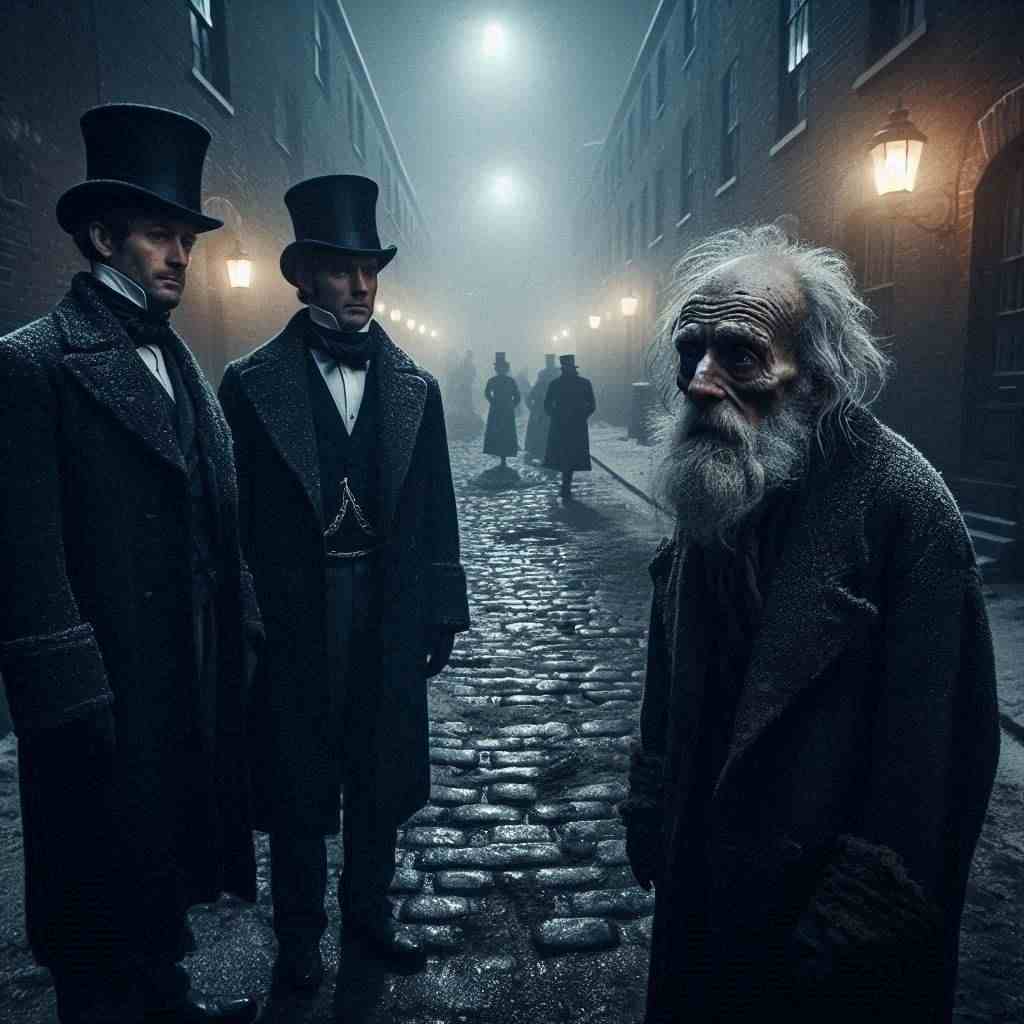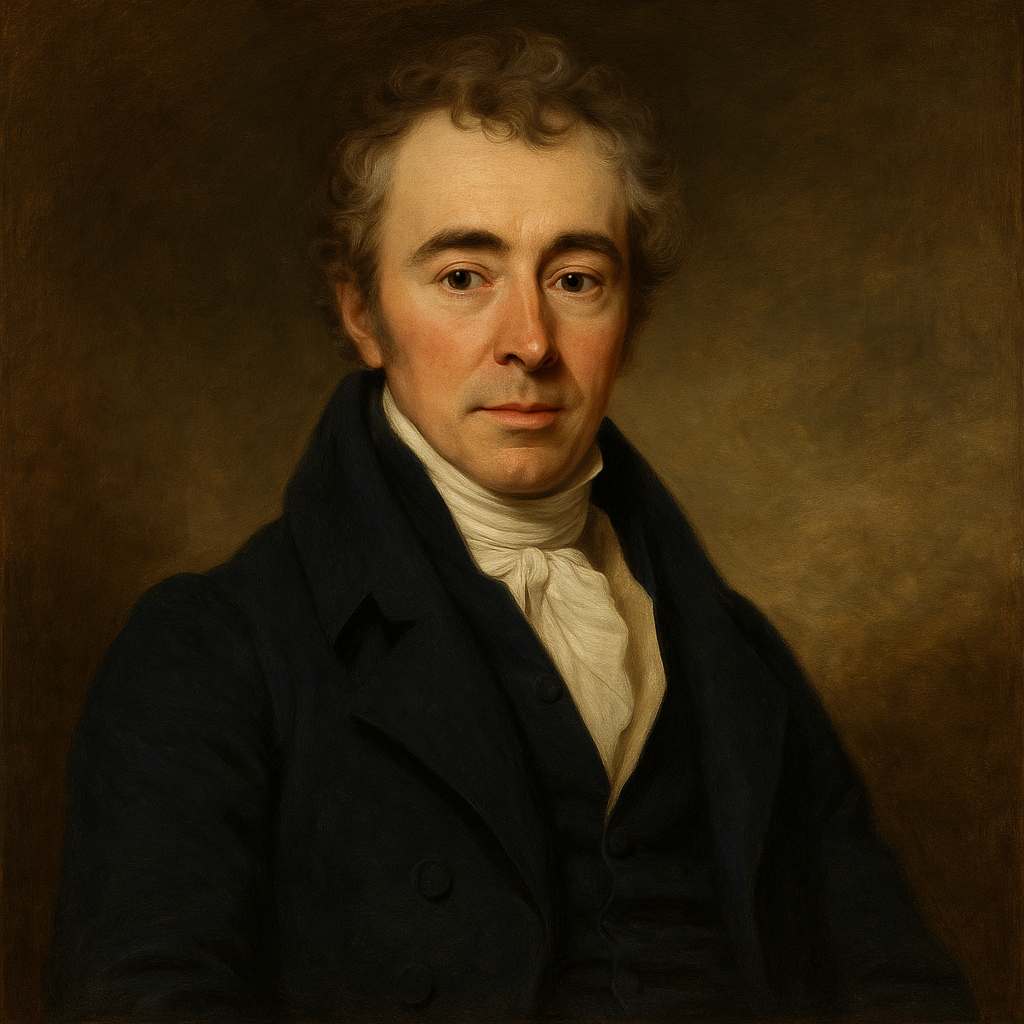The Complaints of the Poor
Robert Southey
1774 to 1843

And wherefore do the Poor complain?
The rich man asked of me,—
Come walk abroad with me, I said
And I will answer thee.
Twas evening and the frozen streets
Were cheerless to behold,
And we were wrapt and coated well,
And yet we were a-cold.
We met an old bare-headed man,
His locks were few and white,
I ask'd him what he did abroad
In that cold winter's night:
'Twas bitter keen indeed, he said,
But at home no fire had he,
And therefore, he had come abroad
To ask for charity.
We met a young bare-footed child,
And she begg'd loud and bold,
I ask'd her what she did abroad
When the wind it blew so cold;
She said her father was at home
And he lay sick a-bed,
And therefore was it she was sent
Abroad to beg for bread.
We saw a woman sitting down
Upon a stone to rest,
She had a baby at her back
And another at her breast;
I ask'd her why she loiter'd there
When the wind it was so chill;
She turn'd her head and bade the child
That scream'd behind be still.
She told us that her husband served
A soldier, far away,
And therefore to her parish she
Was begging back her way.
We met a girl; her dress was loose
And sunken was her eye,
Who with the wanton's hollow voice
Address'd the passers by;
I ask'd her what there was in guilt
That could her heart allure
To shame, disease, and late remorse?
She answer'd, she was poor.
I turn'd me to the rich man then
For silently stood he,
You ask'd me why the Poor complain,
And these have answer'd thee.
Robert Southey's The Complaints of the Poor
Introduction
Robert Southey's "The Complaints of the Poor" stands as a poignant critique of social inequality in early 19th-century England. This poem, written in 1798, reflects the tumultuous period of the Industrial Revolution and its impact on the working class. Southey, a prominent figure of the Romantic era, uses his verse to illuminate the stark contrast between the privileged and the destitute, challenging the reader to confront the harsh realities of poverty. Through a series of vignettes, the poem constructs a narrative that not only exposes the suffering of the poor but also indicts the willful ignorance of the wealthy.
Structure and Form
The poem is structured as a dialogue between the speaker and a rich man, framed by an introductory question and a concluding statement. This conversational format serves to engage the reader directly, making them a witness to the unfolding scenes of poverty. The use of ballad meter, with its alternating lines of iambic tetrameter and trimeter, creates a rhythm reminiscent of folk songs, connecting the poem to oral traditions and lending it an air of authenticity and accessibility.
Southey's choice of rhyme scheme (ABCB) further enhances the poem's musicality while allowing for a natural flow of narrative. This structure, combined with the use of simple, direct language, ensures that the poem's message is conveyed with clarity and force, making it accessible to a wide audience while maintaining its literary merit.
Imagery and Symbolism
The poem is rich in vivid imagery that brings the plight of the poor into sharp focus. The "frozen streets" and the fact that the speaker and the rich man are "wrapt and coated well, / And yet we were a-cold" immediately establish the harsh winter setting. This cold serves as both a literal hardship for the poor and a metaphor for the coldness of society towards their suffering.
Each character encountered symbolizes a different facet of poverty:
- The "old bare-headed man" represents the elderly poor, abandoned and without basic necessities.
- The "young bare-footed child" embodies the innocence of children forced into labor or begging due to familial circumstances.
- The woman with two babies illustrates the plight of military families and single mothers.
- The girl with the "wanton's hollow voice" symbolizes those driven to prostitution by extreme poverty.
These characters are not merely statistical representations but are humanized through brief yet poignant descriptions of their circumstances. The repeated phrase "I ask'd her/him what she/he did abroad" serves as a refrain, emphasizing the speaker's role as an inquirer and witness.
Narrative Technique and Point of View
Southey employs a first-person narrative technique, with the speaker serving as both participant and observer. This choice creates an intimate connection between the reader and the scenes described, making the experiences of the poor more immediate and personal. The rich man's silence throughout the poem, save for his initial question, is a powerful narrative device. His muteness in the face of obvious suffering serves as a damning indictment of the wealthy class's indifference.
The poem's structure as a "walk abroad" allows Southey to present a cross-section of society, offering a panoramic view of urban poverty. This technique is reminiscent of Dante's journey through the circles of Hell in "The Divine Comedy," with each encounter revealing a new depth of human suffering.
Themes and Social Commentary
At its core, "The Complaints of the Poor" is a scathing critique of social inequality and the failure of society to address systemic poverty. The poem explores several interconnected themes:
- Social Responsibility: The rich man's initial question, "And wherefore do the Poor complain?" suggests a disconnect between the wealthy and the realities of poverty. The poem serves as an answer to this question, implicitly arguing for greater social responsibility from the privileged classes.
- The Cycle of Poverty: Each vignette illustrates how poverty affects different demographics, from the elderly to children to women. The poem suggests that poverty is not a choice but a trap from which escape is difficult.
- The Impact of War: The woman whose husband is a "soldier, far away" highlights the economic hardships faced by military families, adding a political dimension to the poem's social commentary.
- Gender and Poverty: The poem pays particular attention to the plight of women, from the mother with two children to the young woman driven to prostitution. This focus underscores the additional vulnerabilities faced by women in a patriarchal society.
- The Failure of Charity: The repeated mentions of begging and charity implicitly critique the inadequacy of individual acts of kindness in addressing systemic issues.
Language and Tone
Southey's language is deliberately simple and direct, eschewing ornate poetic devices in favor of clear, powerful statements. This stylistic choice reflects the Romantic ideal of accessibility and speaks to the urgency of the poem's message. The repetition of phrases like "I ask'd" and "When the wind it blew so cold" creates a rhythmic insistence that underscores the relentlessness of poverty.
The tone of the poem shifts subtly from curiosity to growing indignation. The speaker's initial neutral questioning gives way to more pointed observations, culminating in the final, accusatory statement to the rich man. This progression mirrors the intended effect on the reader, guiding them from ignorance to awareness and, ideally, to a call for action.
Historical and Literary Context
"The Complaints of the Poor" must be understood within the context of the Romantic movement and the social upheavals of the late 18th and early 19th centuries. The Industrial Revolution had led to rapid urbanization and a widening gap between the rich and the poor. Romantic poets like Southey, William Wordsworth, and Samuel Taylor Coleridge were responding to these changes by championing the rights of the common people and critiquing the dehumanizing aspects of industrialization.
The poem also reflects the influence of the French Revolution and its ideals of equality and social justice. While Southey later became more conservative in his political views, this early work clearly aligns with radical critiques of social inequality.
Influence and Legacy
Southey's poem has had a lasting impact on social reform literature. Its technique of using individual stories to illuminate broader social issues can be seen in later works such as Charles Dickens' novels and George Orwell's journalistic essays. The poem's unflinching portrayal of poverty and its implicit call for social change align it with the tradition of protest literature that continues to this day.
Moreover, "The Complaints of the Poor" serves as a precursor to the social realist movement in literature, which sought to accurately depict the conditions of the working class. Its influence can be traced through works like Elizabeth Gaskell's "Mary Barton" and the poetry of the Chartist movement.
Conclusion
Robert Southey's "The Complaints of the Poor" stands as a powerful indictment of social inequality and a call for greater empathy and action. Through its vivid imagery, carefully structured narrative, and direct language, the poem brings the realities of poverty into stark relief. It challenges readers, particularly those of privilege, to confront their own complicity in systems of inequality.
The poem's enduring relevance speaks to the persistence of social and economic disparities in modern society. As we continue to grapple with issues of poverty, homelessness, and economic injustice, Southey's words serve as a reminder of the human cost of inequality and the moral imperative to address it. In its fusion of artistic merit and social commentary, "The Complaints of the Poor" exemplifies the power of literature to bear witness, to challenge, and to inspire change.
This text was generated by AI and is for reference only. Learn more
Want to join the discussion? Reopen or create a unique username to comment. No personal details required!



Comments
No comments yet. Be the first to comment!